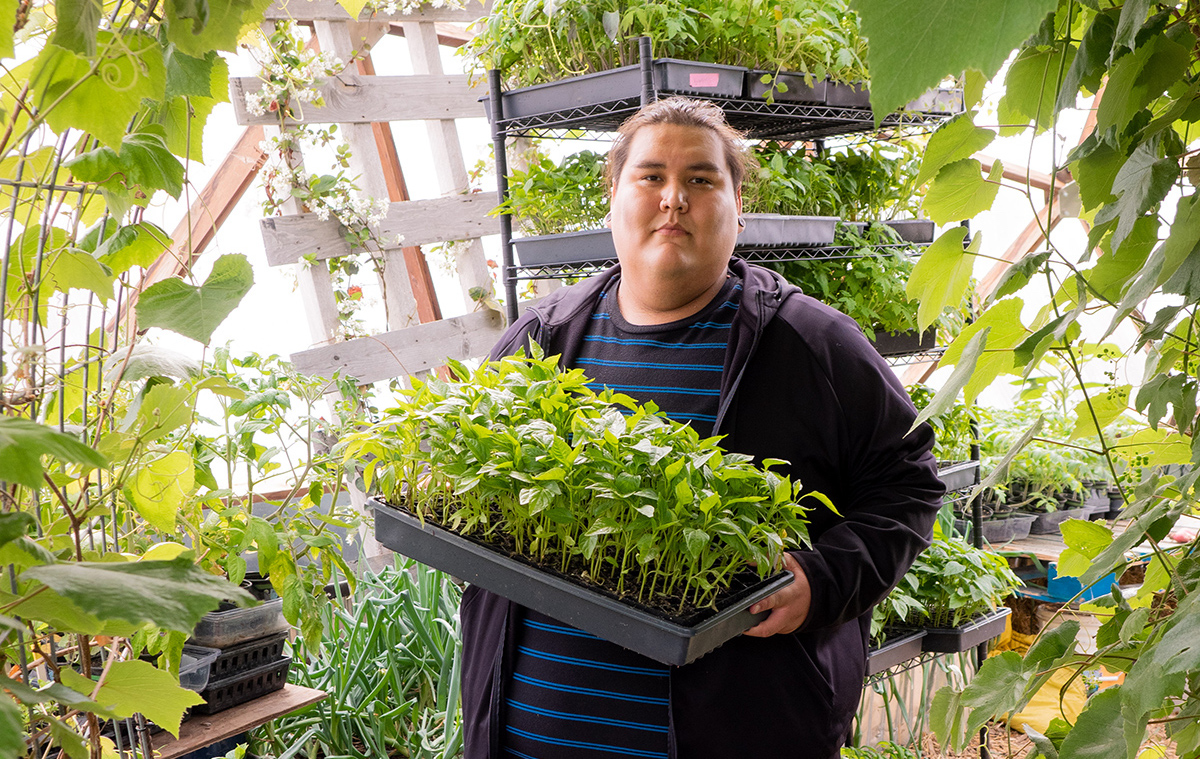
- Details
- By Joe Boomgaard
- Economic Development
New grant funding will help Sicangu Community Development Corporation to communicate with its community members about the sustainability of the Rosebud Sioux Tribe’s traditional agricultural practices.
The Mission, S.D.-based nonprofit, which focuses on education, food sovereignty, health and housing initiatives grounded in Lakota values, was among the 16 Indigenous-led organizations selected to share an initial round of more than $1 million in grant funding the Indigenous Earth Fund. The funding aims to bolster Indigenous efforts on climate change and conservation nationwide.
Sicangu CDC plans to leverage its successes with the Wolakota Buffalo Range and the Sicangu Food Sovereignty Initiative to drive its message home. The goal, according to Matte Wilson, director of the Sicangu CDC’s Food Sovereignty Initiative, is “to demonstrate Indigenous leadership and share best practices around conservation and regenerative agriculture.”
Want more news like this? Get the free weekly newsletter.
“We plan to use this funding in the production of various forms of media and resources that can be used by members of our community who are seeking to grow or forage their own food in a way that works in concert with the natural world,” Wilson said in an email to Tribal Business News.
“Our hope is to remain a leading advocate in ensuring that Indigenous voices continue to build and shape the regenerative movement,” Wilson said.
The funding for the initial round comes from New York City-based Liberated Capital, a donor community and funding vehicle that seeks to liberate BIPOC communities and facilitate racial healing. Liberated Capital is part of the Decolonizing Wealth Project, which was founded in 2018 by Edgar Villanueva (Lumbee).
The grants ranged from $25,000 to $75,000 and were focused on five key areas: environmental justice, racial economic justice, democracy and civil engagement, equitable development, and civil rights and liberties. A fund advisory committee of all Indigenous members selected the 16 grantees from a pool of 36 applicants who answered a call for proposals that began in October 2021, according to a statement.
In addition to Sicangu CDC, the grantees included:
- Affiliated Tribes of Northwest Indians, Portland, Ore.
- Bears Ears Inter-Tribal Coalition, Sacramento, Calif.
- Children of the Setting Sun Productions, Bellingham, Wash.
- Indian Country Grassroots Support, Farmington, N.M.
- Indigenous Environmental Network, Bemidji, Minn.
- Indian Land Tenure Foundation, Little Canada, Minn.
- Native Movement, Fairbanks, Alaska
- Native Organizers Alliance, New York, N.Y.
- Northern Alaska Environmental Center, Fairbanks, Alaska
- Protect the Sacred (Harness), Marina del Rey, Calif.
- SAGE Development Authority, Portland, Ore.
- Save California Salmon, Orleans, Calif.
- Seventh Generation Fund for Indigenous Peoples Inc., Arcata, Calif.
- Sogorea Te’ Land Trust, Oakland, Calif.
- Water Protector Legal Collective, Albuquerque, N.M.
“We are honored to invest in Indigenous-led organizations that are leading the fight against climate change,” Villanueva said in a statement. “Indigenous communities are guided by thousands of years of conservation techniques and solutions, arming them with the knowledge and the power to reverse climate destruction. It’s past time that philanthropy prioritize its support towards Indigenous communities so they can continue leading us toward a more sustainable future.”
The Indigenous Earth Fund aims to become an annual grant-making program that embraces the “diverse wisdom that Indigenous communities have been cultivating for thousands of years, and will help convene Indigenous-led organizations and inter-tribal organizations and networks to elevate and discuss strategies and best practices that address the current climate crisis.”
